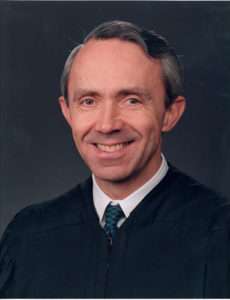The Volokh Conspiracy
Mostly law professors | Sometimes contrarian | Often libertarian | Always independent
Today in Supreme Court History: October 3, 1990
10/3/1990: Justice David Souter takes the oath.

Editor's Note: We invite comments and request that they be civil and on-topic. We do not moderate or assume any responsibility for comments, which are owned by the readers who post them. Comments do not represent the views of Reason.com or Reason Foundation. We reserve the right to delete any comment for any reason at any time. Comments may only be edited within 5 minutes of posting. Report abuses.
Please to post comments


If there’s a Jay-Hey, some multibillion Conglomerate will acquire Souter’s grave via Eminent Domain, heck, a Condom Dispenser would make more money than most graves.
Re-Nigging on “Read my Lips” (remember the Clip of GHWB in those ridiculous 80’s NBA Short -Shorts sneering “Read my Hips!” Before sashaying off like Ginger Rogers) Nominating Souter, 1990 wasn’t one of GHWB’s better years until So-damn Insane bailed him out by invading Kuwait
Frank
WTF?
This is what happens when you post a comment before the drugs have wared off.
So wait until they wear off then.
Ls in the chat.
Justice Souter delivered an opinion that should be seen as one of the most significant in about the past century and seen as the foundation for many of the opinions of SCOTUS justices in and since 1999 that have discussed the sovereignty of the people. For example, as Justice Alito (joined by Justices Scalia and Thomas) put it in a dissenting opinion in Obergefell v. Hodges, 576 U.S. 644, 741 (2015), "In our system of government, ultimate sovereignty rests with the people, and the people have the right to control their own destiny."
In Alden v. Maine, 527 U.S. 706 (1999), Justices Souter, Stevens, Ginsburg and Breyer dissented. As a result of the power of their opinion. even the majority opinion (by Justices Kennedy, O'Connor, Scalia and Thomas and Chief Justice Rehnquist) acknowledged that "the Constitution begins with the principle that sovereignty rests with the people."
Justice Souter's dissenting opinion was far more powerful and enlightening. It emphasized that James Wilson (the only person to sign the Declaration of Independence and the Constitution and serve as a SCOTUS justice and the person most responsible for our Constitution's first words (We the People)) emphasized in 1787 "that the sovereignty resides in the people; they have not parted with it; they have only dispensed such portions of the power as were conceived necessary for the public welfare." This "expressed the major premise of what would later become Justice Wilson's position in Chisholm" in 1793, i.e., that "the people" are "sovereign."
"In representing Chisholm, Edmund Randolph, the Framer and then Attorney General" emphasized that "the present Constitution produced a new order of things. It derives its origin immediately from the people."
"Justice Wilson took up the argument for the sovereignty of the people more vociferously. Building on a conception of sovereignty he had already expressed at the Pennsylvania ratifying convention, [above] he began by noting what he took to be the pregnant silence of the Constitution regarding sovereignty:
'To the Constitution of the United States the term SOVEREIGN, is totally unknown. There is but one place where it could have been used with propriety [i.e., only in the Preamble and only by the People] who ordained and established the Constitution. They might have announced themselves 'SOVEREIGN' people of the United States: But serenely conscious of the fact, they avoided the ostentatious declaration.' "
"Chief Justice Jay took a less vehement tone in his opinion, but he, too" emphasized "at the Revolution, the sovereignty devolved on the people; and they are truly the sovereigns of the country, but they are sovereigns without subjects (unless the African slaves among us may be so called) and have none to govern but themselves; the citizens of America are equal as fellow citizens, and as joint tenants in the sovereignty."
"Starting in the mid-1760's, ideas about sovereignty in colonial America began to shift as Americans argued that, lacking a voice in Parliament, they had not in any express way consented to being taxed. See B. Bailyn, The Ideological Origins of the American Revolution 204-219 (1968); G. Wood, The Creation of the American Republic, 1776-1787, pp. 347-348 (1969). The story of the subsequent development of conceptions of sovereignty is complex and uneven; here, it is enough to say that by the time independence was declared in 1776, the locus of sovereignty was still an open question, except that almost by definition, advocates of independence denied that sovereignty with respect to the American Colonies remained with the King in Parliament."
"The National Constitution formally and finally repudiated the received political wisdom that a system of multiple sovereignties constituted the 'great solecism of an imperium in imperio,' cf. Bailyn, The Ideological Origins of the American Revolution, at 223." Once 'the atom of sovereignty' had been split, U.S. Term Limits, Inc. v. Thornton, 514 U.S. 779, 838 [ ] (1995) (KENNEDY, J., concurring), the general scheme of delegated sovereignty as between the two component governments of the federal system was clear, and was succinctly stated by Chief Justice Marshall: 'In America, the powers of sovereignty are divided between the government of the Union, and those of the States. They are each sovereign, with respect to the objects committed to it, and neither sovereign with respect to the objects committed to the other.' McCulloch v. Maryland, 17 U.S. 316, 4 Wheat. 316, 410 [ ] (1819)."
Do you just use a macro to generate this?